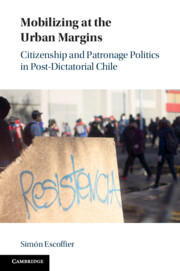Book contents
- Mobilizing at the Urban Margins
- Mobilizing at the Urban Margins
- Copyright page
- Contents
- Figures and Tables
- Acknowledgments
- Abbreviations and Acronyms
- Terms
- Introduction
- 1 The Mobilizational Citizenship Framework
- 2 The History of Mobilization in Chile’s Urban Settings
- 3 The Demobilization of the Urban Margins
- 4 Memory of Subversion
- 5 We, the Informal Urban Dwellers
- 6 Protagonism and Community-Building
- Conclusion
- Book part
- References
- Index
6 - Protagonism and Community-Building
Published online by Cambridge University Press: 25 May 2023
- Mobilizing at the Urban Margins
- Mobilizing at the Urban Margins
- Copyright page
- Contents
- Figures and Tables
- Acknowledgments
- Abbreviations and Acronyms
- Terms
- Introduction
- 1 The Mobilizational Citizenship Framework
- 2 The History of Mobilization in Chile’s Urban Settings
- 3 The Demobilization of the Urban Margins
- 4 Memory of Subversion
- 5 We, the Informal Urban Dwellers
- 6 Protagonism and Community-Building
- Conclusion
- Book part
- References
- Index
Summary
This chapter explains how activists in the urban margins decentralize protagonism to transform a mobilizing collective identity into citizenship-building. It uses Gamson’s typology of micromobilizing acts to analyze their face-to-face interactions within three types of encounters: organizing, divesting, and reframing acts. Based on interviews and observations, it shows how activists conceive their collective identity of mobilization as political capital and consequently strategize to diffuse it. In other words, the activists teach each other the identity symbols and values that both promote and validate collective action locally. Within the local social movement community, political capital usually flows from informal leaders to younger, less experienced activists and potential challengers. This socialization process progressively certifies young local activists as community-builders, both individually and collectively. It also makes it more likely for individual leaders to be replaced by others once they decide to quit their role. In turn, this decentralization of protagonism promotes citizenship-building and enduring mobilization, thus creating mobilizational citizenship.
Keywords
- Type
- Chapter
- Information
- Mobilizing at the Urban MarginsCitizenship and Patronage Politics in Post-Dictatorial Chile, pp. 169 - 194Publisher: Cambridge University PressPrint publication year: 2023



